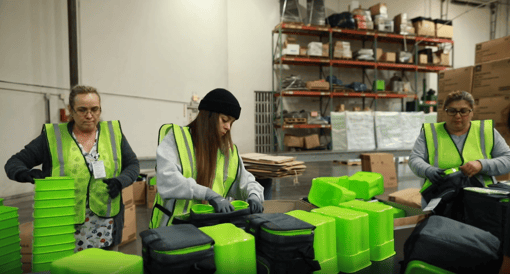We all know that speed is a key part of supply chain efficiency. It may seem counterintuitive that a service with “postponement” in its name could increase speed and efficiency, but it can. We’re talking about inventory postponement and, in this article, we’ll explain what it is, what its benefits are, and how to find a provider that can handle it for your supply chain.
What is inventory postponement?
Inventory postponement, also known as ‘delayed product configuration,’ is a strategy used in the supply chain to delay the final customization or assembly of products until closer to the time of consumer purchase. Instead of pre-assembling or customizing products and storing them in finished form in the warehouse, companies practice inventory postponement to keep components or generic products in stock until specific customer orders are received.
The goal of inventory postponement is to increase flexibility and responsiveness in the supply chain while reducing the overall costs associated with storing and managing finished goods. This strategy allows companies to adapt quickly to changes in customer demand, market conditions, or product specifications. It can be particularly useful in direct-to-consumer fulfillment as well as in industries where products have a high level of customization, or where there is a risk of obsolete inventory due to rapid changes in technology or consumer preferences.
Benefits of a postponement strategy
 By keeping components or generic products in inventory and postponing final assembly or customization until the last possible moment, companies can better match supply with actual demand. This can lead to reduced holding costs, reduced storage usage (if finished products take up more space than the components), lower levels of obsolete inventory, and increased overall efficiency in the supply chain.
By keeping components or generic products in inventory and postponing final assembly or customization until the last possible moment, companies can better match supply with actual demand. This can lead to reduced holding costs, reduced storage usage (if finished products take up more space than the components), lower levels of obsolete inventory, and increased overall efficiency in the supply chain.
Postponement is also a key component of meeting specific retailer demands. At Weber Logistics, for example, we routinely configure consumer goods case packs with different SKUs of the same product to support variations in retailer and labeling requirements. This goes beyond product manipulation and focuses on carton sorting and customization for specific retail rollouts of clients’ products.
Postponement in action
At Weber Logistics, inventory postponement is one of the many value-added services we provide to our clients. The following is just one example of postponement in action.
A leading seller of coolers, totes and lunch packs imports components of their soft-shelled coolers from overseas to a Weber warehouse. As their logistics provider, we perform the final product configuration by opening up the soft coolers, integrating the hard shells, and creating a different cooler with both components. Read our case study to learn how this strategy saves the company over $500,000 annually on freight and storage costs.
What to look for in a 3PL that performs inventory postponement
If you’re considering having postponement operations performed within the warehouse, the following are just a few of the key characteristics you’ll want to see in a 3PL partner.
- Systems capabilities: Your 3PL’s inventory management system should be able to track all instances of inventory in real-time. This includes both components and finished products as well as inventory spread across multiple locations and inventory used for different sales channels.
- Labor flexibility: You’ll want to make sure your 3PL partner can scale up in terms of labor and resources to perform postponement projects like the ones described above. 3PL providers with multiple logistics campuses near one another tend to be adept at this as they can ‘borrow’ associates from one facility to fill support another.
- Vender compliance expertise: Many 3PL providers specialize in helping CPG companies meet the precise vendor compliance requirements of big box retailers. This includes monitoring routing guide changes and ensuring that products are configured and delivered precisely as ordered to avoid retail chargeback penalties.
Turn to Weber for value-added warehousing services
At Weber Logistics, inventory postponement is a strategy that adds value for our clients through flexibility, cost efficiency, and customized solutions. It is part of Weber’s suite of value-added warehousing services, which include additional efficiency-boosting capabilities like kitting, repackaging, display building, labeling/ticketing, product testing and quality management. To learn more about how Weber Logistics can supercharge your supply chain from the West Coast, contact us today.





 Capital Management
Capital Management